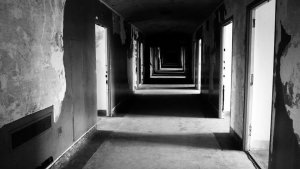I almost never remember my dreams. I am certain that I dream most nights, but at best, I retain only a vague synopsis or a phantasm of the feelings inspired. Despite this, I have one reoccurring dream that my mind holds onto despite my efforts to forget the morbid stillness of the tableau.
In the dreamspace, there exists only a room. The floor is covered in white tile that extends into an undefinable vagueness around the edges. At the center of the room is a sunken pool, a large square depressed into the ground about a foot. The tub is mostly filled with gently rippling water which reflects the glow of lighting that feels coldly institutional. The grout between the squares of ceramic are a pale brown-red where water had been splashed during a struggle. The water of the pool is pink with what I am certain is my blood.
I never understood why this image inspired dread upon awakening, until I mentioned the dream one day in passing to my mother. She had been washing dishes at the time, and stopped to listen as I talked. I remember the silence that followed my description, and the deep breath she took as she set the item she had been holding back into the sink. Turning to me, she told me that she had hoped I would not remember that place, but because I had, I needed to know.
You see, when I was almost 3 years old my parents had left me with the sitter they and many of the families in our neighborhood had been using for years. The woman ran a childcare service out of her home, and unknown to all the parents was over the capacity she had been legally licensed to care for. This fact came to light when one day I was loose in the kitchen while she was making Jell-O. With the infamous timing found in nightmares and fiction, I managed to get underfoot just as she lifted the steaming bowl from the counter to bring to the fridge to cool.
The burns on my little feet were horrific.
I was rushed to the hospital, where my parents met me. In a twist of luck also rarely found in the real world, one of Canada’s best plastic surgeons was in the receiving area of the ER as I was dragged in and decided to take my case.
Each day, my toes had to be cut free from each other and the wrappings the doctors had to use to keep them separated. Despite medications and the other treatments they used, necrosis had been unavoidable. To keep the infection under control, my dead skin had to be scraped off with a stiff bristled brush nearly daily. My mother, late in her pregnancy with my younger brother, had to hold me down as I screamed and thrashed so a nurse could do the gristly task in a shallow depressed pool in a white tiled room.
It was both brutal and necessary, but because of those chances and the choices of all involved, my feet eventually healed and grew normal and whole. Even so, my mother says that was the hardest thing she has ever done. She took a leave of absence from work to stay with me in the hospital and only left my side at night when my father took the vigil with me. After catching what sleep she could in the Ronald McDonald House next door, she would return to let my dad shower and go to work. That experience and kindness is why the Ronald McDonald House is one of my favorite charities.
I’ve often read stories where writers use dreams to have characters cope with traumatic events that occured in the buried past, but never believed that it happened in real life. After all, if the person wasn’t old enough to remember, how could the trauma reappear in dreams? How could it be so specific and real? I would have sworn that it wasn’t possible. Apparently, I was wrong.



![dan_wells[1]](http://www.fictorians.com/wp-content/uploads/2014/02/dan_wells1-215x300.jpg) A guest post by Dan Wells.
A guest post by Dan Wells.